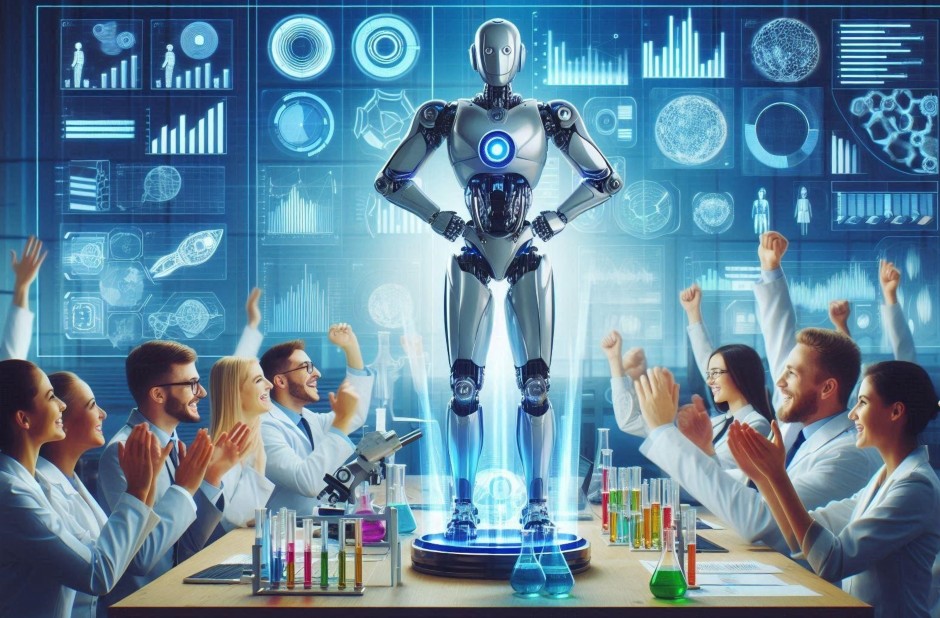In recent years, there has been a significant advancement in the field of Artificial Intelligence (AI) and Augmented Reality (AR). These technologies have become increasingly popular and have the potential to enhance virtual experiences in various fields such as gaming, education, healthcare, and...
Robot Made a Scientific Discovery on Its Own for the First Time

The scientific world has reached a historic milestone with the emergence of fully autonomous robot scientists capable of making independent discoveries. The Robot Scientist "Adam" has proven the potential of such systems by identifying twelve genes responsible for catalysing specific reactions in the metabolic pathways of the yeast Saccharomyces cerevisiae, marking the first time a robot has completed the entire scientific discovery process without human intervention.
The Dawn of Autonomous Scientific Discovery
Robot Scientists use techniques from artificial intelligence to automate all aspects of the scientific discovery process: they generate hypotheses from a computer model of the domain, design experiments to test these hypotheses, run the physical experiments using robotic systems, analyse and interpret the resulting data, and repeat the cycle. This represents a fundamental shift from traditional laboratory automation to truly intelligent scientific investigation.
Science laboratories across disciplines are on the verge of a sweeping transformation as robotic automation and AI lead to faster and more precise experiments that unlock breakthroughs in fields like health, energy and electronics. The integration of artificial intelligence with physical laboratory equipment has created systems capable of hypothesis-driven research.
How Robot Scientists Work
The autonomous discovery process follows a sophisticated closed-loop learning system. The system automatically generates hypotheses from available background knowledge and models, designs physical experiments to test these hypotheses, carries out the experiments on a laboratory robotic system, and then analyses and interprets the results.
Key Components of Robot Scientists
- Computer-controlled scientific instruments for precise data collection
- Integrated robotic automation to link instruments together seamlessly
- Computational models of the research domain
- Artificial intelligence and machine learning for hypothesis generation and result interpretation
- Formalized scientific discovery processes for reproducible research
Breakthrough Achievements in 2024
Researchers have developed a framework that defines five levels of automation, from manual operation to full automation where robots and AI systems operate with complete autonomy, including self-maintenance and safety management. This systematic approach helps laboratories progress toward fully autonomous scientific discovery.
Recent advances in deep learning, generative AI and foundation models are transformative, allowing scientists to mine scientific literature, brainstorm new hypotheses, and use deep learning to make discoveries that would have otherwise remained hidden. The combination of these technologies with robotic systems has accelerated the timeline for autonomous discovery.
Real-World Applications
Robot scientists are already making significant contributions across multiple fields:
- Drug Discovery: AI-driven robots are identifying new therapeutic compounds and optimizing drug formulations
- Materials Science: Autonomous systems are discovering new materials with specific properties for electronics and energy storage
- Genomics: Robot scientists are identifying gene functions and metabolic pathways in various organisms
- Environmental Science: Autonomous underwater and aerial robots are conducting ecological research and tracking wildlife

The Technology Behind Autonomous Discovery
Roboticists have made major breakthroughs in combining different sorts of data and making it all useful and legible to a robot. Modern robot scientists can process vast amounts of experimental data, scientific literature, and observational information to generate novel hypotheses.
AI advances are rapidly speeding up the process of training robots, helping them do new tasks almost instantly by merging data sources properly into new AI models. This breakthrough has set the stage for robots that can adapt their research methods based on experimental outcomes.
Impact on Scientific Research
The emergence of autonomous robot scientists promises to revolutionize research in several ways:
Accelerated Discovery
Robotic systems can perform experiments continuously without human fatigue, significantly speeding up research while executing precise experimental steps with greater consistency than humans. This 24/7 operation capability means scientific investigations can proceed around the clock.
Enhanced Safety and Precision
Robots reduce safety risks by handling hazardous substances and allow scientists to focus on higher-level research questions, paving the way for faster breakthroughs in medicine, energy and sustainability.
Reproducible Science
Because computers are involved throughout, it is possible to explicitly capture every detail of the scientific discovery process: goals, hypotheses, results, conclusions, and valuable meta-data such as environmental conditions and instrument settings. This comprehensive documentation ensures that discoveries can be verified and built upon by other researchers.
Future Implications
Autonomous discovery harnesses the power of robotics, machine learning and artificial intelligence to solve big problems, with researchers exploring how AI can run hundreds of experiments, evaluate results, identify patterns and determine next steps.
The development of robot scientists represents more than just laboratory automation—it signifies a new era where artificial intelligence can contribute original knowledge to human understanding. As these systems become more sophisticated, they may uncover patterns and relationships that human researchers might miss, leading to unexpected breakthroughs across all scientific disciplines.
While challenges remain in terms of ensuring ethical AI development and maintaining human oversight, the successful demonstration of autonomous scientific discovery marks a pivotal moment in the history of science. The collaboration between human creativity and machine precision promises to accelerate our understanding of the natural world in ways previously unimaginable.



